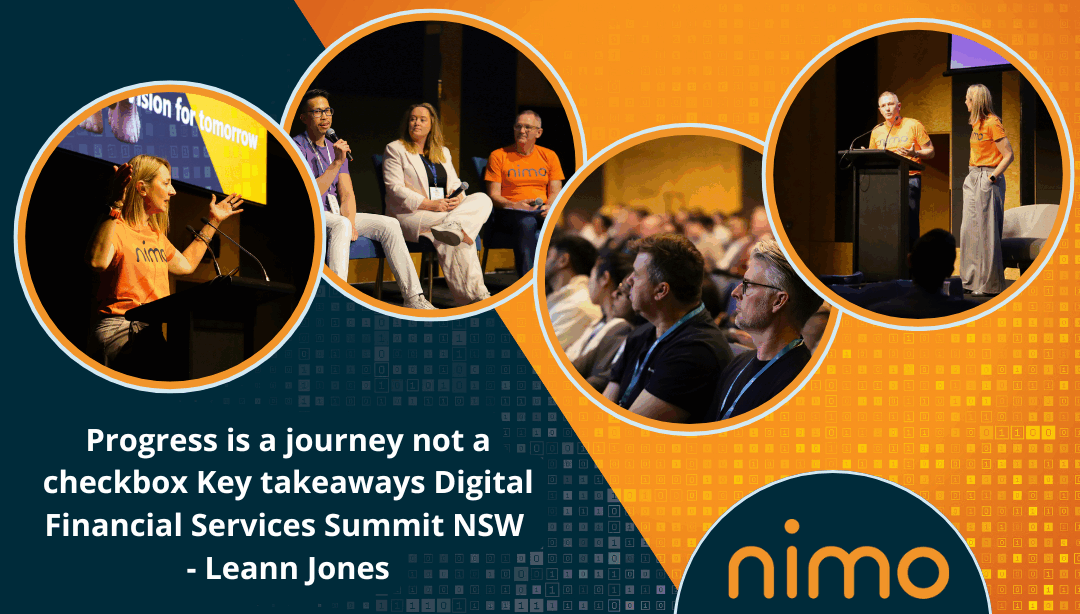Never thought I’d start a FinTech blog by congratulating Tay Tay and Travis… but there we go, congratulations to both!
So, what’s the connection between Taylor and Travis and the Digital Financial Services Summit 2025? As the day’s emcee, we kicked things off by exploring global disruptors, and this dynamic duo made the list, alongside other headline-grabbing topics such as green energy, deepfakes, identity theft and even WhatsApp.
One question kept coming up across all these global disruptions: What makes them succeed or fail? What helps, and what hinders? What gets in the way and what lifts a new way of being?
Bringing it back to the Financial Services Summit and our theme, “Embracing a New Era of Innovation in Financial Services,” we asked how we can take lessons from global disruptions and apply them to our industry. How can we balance economic productivity and growth, support customers’ ever-evolving digital expectations, innovate for the future in a highly regulated environment and reshape the financial services sector? It was a thought-provoking discussion that set the scene for an enlightening day in Sydney.
Throughout the summit, panels, breakout sessions and case studies reinforced a few key ideas:
Simplicity is powerful.
Complex systems can be made effortless for customers without losing sophistication, a concept at Nimo we call sophisticated simplicity. From managing multiple home loans and securities across split loans to delivering seamless digital experiences, simplicity is at the heart of effective financial innovation.
AI and the future skill gap.
Thinking skills and curiosity will be key. If we don’t push and develop these skills now, a gap will emerge as reliance on AI grows. It’s essential to teach skills and pair them with the ability to question, analyse, and validate insights, preparing teams to work confidently alongside AI.
Innovation takes time.
Creating impact on a global scale doesn’t happen overnight. The discussion took me, and others, back to the days of travelling and hunting down internet cafés, plugging into modems, and hoping our emails would load. A vivid reminder that while the internet had arrived, widespread adoption and its impact on productivity took years to materialise. The technology stream reinforced that patience is critical when innovating. Testing, measuring, and learning are essential before landing on the winning approach. There may be bumps along the way, but the journey is just as important as the outcome.
Structure matters too.
Building new ideas, systems and metrics is essential. Innovation also requires processes and organisational structure that give ideas space to flourish, be amplified to enterprise scale, or in some cases space for ideas to be tested, fail safely and ‘go off to die’. Clear scientific measures are increasingly critical. Be clear on the business purpose and use case (don’t start with the tool and find a problem for it to solve), what adoption looks like, define impact metrics and relate back to performance indicators.
Understand your people and customers.
The customer is naturally at the heart of everything we do, technology alone isn’t the solution. The customer experience stream reminded us that success comes from deeply understanding the unique needs of each customer, rather than simply ‘stitching together’ experiences. Segmentation, personalisation, unearthing pain points and cross-functional (fusion) teams were all part of the conversation, but the key takeaway was the need to continuously mature how we approach and deliver customer experience.
Resilience and security matter.
Fraud and risk are ever-present realities. Tracy Hall, author of The Last Victim, shared her jarring story of being defrauded by the now-jailed Hamish McLaren. Despite losing her life savings, Tracy blew us away with her resilience, showing that even life’s toughest experiences can be turned into lessons that help others. Fraud can happen to anyone and, as scammers get more sophisticated (yes, I learnt what Pig Butchering and the Yahoo Boys are), it is on us to protect our digital identities (and those we serve and care for). Trust is important, but we must always verify.
From global disruptors to AI skills and customer experience, the Summit reminded me that progress is a journey, not a checkbox. Patience, structure, measurement, simplicity and a deep understanding of people are just as critical as the technology itself.
It also reminded me that progress happens at all scales, from the little things I can do at home, like tightening security on IDs or removing unnecessary voicemail, to the big things we can do at work to simplify processes, protect customers, and stay curious. Staying thoughtful, brave and attentive in both work and life is what shapes innovation and meaningful impact.
A truly insightful day with plenty of takeaways. Thanks to the organisers for having me as emcee. It was an absolute privilege!
If you’re ready to embrace digital transformation, what are you waiting for?
 |
AUTHOR Leann JonesChief Executive Officer – Nimo Industries |
As CEO and co-founder of Nimo Industries, Leann leads the charge in driving digital transformation within the financial services sector. Having led change in the banking industry and witnessing the challenges lenders face in digitising processes—due to internal complexities, outdated legacy systems, and overly complicated solutions—Leann brings a unique perspective. Coupled with a background and practice in organisational psychology, she understands the cultural dynamics crucial for successful digital adoption and change management.
As adoption of the Nimo platform grows across financial services, Leann is passionate about not only implementing and digitising lending processes for lenders and members but also helping lenders navigate the complexities of transformation. She works to overcome the “this too shall pass” mindset, which can hinder progress. Nimo’s approach combines cutting-edge technology with a deep understanding of human behaviour, enabling FinTechs to succeed where others fail.
